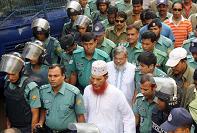
Download A senior leader of Bangladesh's largest Islamic party is the first suspect charged by a tribunal probing the 1971 independence struggle against Pakistan.
The war crimes tribunal accused Delwar Hossain Sayedee of mass murder and torture among other crimes.
He denies all the allegations.
Mr Sayedee, a leader in Bangladesh's Jamaat-e-Islami party, was arrested last year.
David Bergman was at the court when the decision was made.
It’s Monday and I am standing outside an imposing building in Dhaka where very shortly we will find out whether the international crimes tribunal will hand down its very first indictment alleging international crimes during Bangladesh’s 1971 war. I am just going to go into to hear the order now.
The prosecutor, Syed Rezaur Rahman announces that Delwar Hossain Sayedee has been charged for crimes including mass killings, rape, loot, religious conversion.
He is also accused of looting and then setting fire to the houses of freedom fighters, Hindus and members of the opposition.
Q: Sir can I ask you how do you feel about today decision as a prosecutor?
“I have no personal feeling as one of the prosecutors. Thank you very much.”
However, others who came to see the hearing were willing to express themselves.
Shahjahan Siddiqui who fought in the 1971 independence war, was one of them.
Q: How do you feel about today’s decision?
“I am happy. The country of Bangladesh is liberated by war of liberation. In the war we fought for liberation. There are few peoples who not only denied the independence but also fought against it. And they killed some of the freedom fighter, they raped, they were involved in arson they are involved in burning, they were involved in burning. At last the trial has actually started. If on production of evidences, not found guilty he will be released. If found guilty he deserves to be punished.”
Sayedee, who is a leader in Bangladesh's Jamaat-e-Islami party, has pleaded not-guilty to all of the twenty counts.
Tajul Islam is one of Sayedee’s lawyers.
“Court has framed charge on 20 counts against our client. Since court has passed order we are duty bound to obey but we are not satisfied. And we think we have raised so many law points, so many grounds we have taken on the basis of evidence placed before this tribunal. We think that all the questions we raised are not properly answered here and we think there are sufficient grounds to review this order. We are preparing ourselves to file a review petition against this order passed today.”
He is also concerned that the proposed date for the trial at the end of the month does not provide his team time to prepare themselves to defend Sayedee.
“I think it is not a proper date. I think it will not ensure justice as only 27 days that is not sufficient time to prepare a defence case. Our law says minimum 21 days. We have said repeatedly this is not sufficient for preparing a defense case like a case of war crimes. You have already noticed that on 20 courts, charges have been framed, and the prosecution had taken more than 1 year time to investigate this case. Similarly we need time to prepare the defense case. So only 27 days is simply impossible for preparing the defence case, and this will not ensure fair trial.”
Government figures estimate that hundreds of thousands of people died and thousands of women were raped when West Pakistan sent in its army to try and stop East Pakistan becoming an independent Bangladesh.
Last year, the Bangladeshi government set up the International Crimes Tribunal in Dhaka to try those Bangladeshis accused of collaborating with Pakistani forces and committing atrocities during months of violence.
Sayedee is among seven people, including two from the main opposition Bangladeshi Nationalist Party, facing trial.
All of them deny the accusations and accuse the government of carrying out a vendetta.
But the registrar of the court Md Shahinur Islam is confident that the trial will be a fair one.
“You know the tribunal has been functioning according to Act of 1973 and the rules framed by the tribunal under the powers conferred by the act which are basically quite compatible with the universally recognized norms and principles, attention to due process of law and highest degree of fairness and I do believe that for that despite concerns raised by many international organizations there should be no disagreement that equal opportunity of both the sides has to be afforded and in ensuring it the tribunal is quite conscious..”
I am about to enter the office of the International Crimes Tribunal investigating agency which is responsible for collecting evidence against those accused of crimes in 1971.
Abdul Hannan Khan is head of the investigation team.
“At the moment we are investigating against seven people and as you know we have completed one investigation and submitted it to court.”
I ask him about the difficulty of investigating crimes that Sayedee was alleged to have committed 40 years ago.
“Initially it very difficult I think but even then we can track down the people especially some victims themselves are still alive and victim’s family are still alive. In our country most people went to freedom fighting at the age of 15 to 25, so if we add 25 to 40 years it comes to 65 years. Now in Bangladesh 65 years is nothing. There are many people living, you know. So we cannot say that people’s memory have already frail in all cases, no. People still remember it, their stories. There are lot of victims, lot of victims families still alive and there are the eye witnesses also.”
The New York-based Human Rights Watch says the tribunal needs to change some of its procedures to ensure a fair trial which meets international standards. The tribunal however argues that it is a national tribunal that does not have to meet international standards
The trial is likely to go on for months.














Comments
RSS feed for comments to this post.